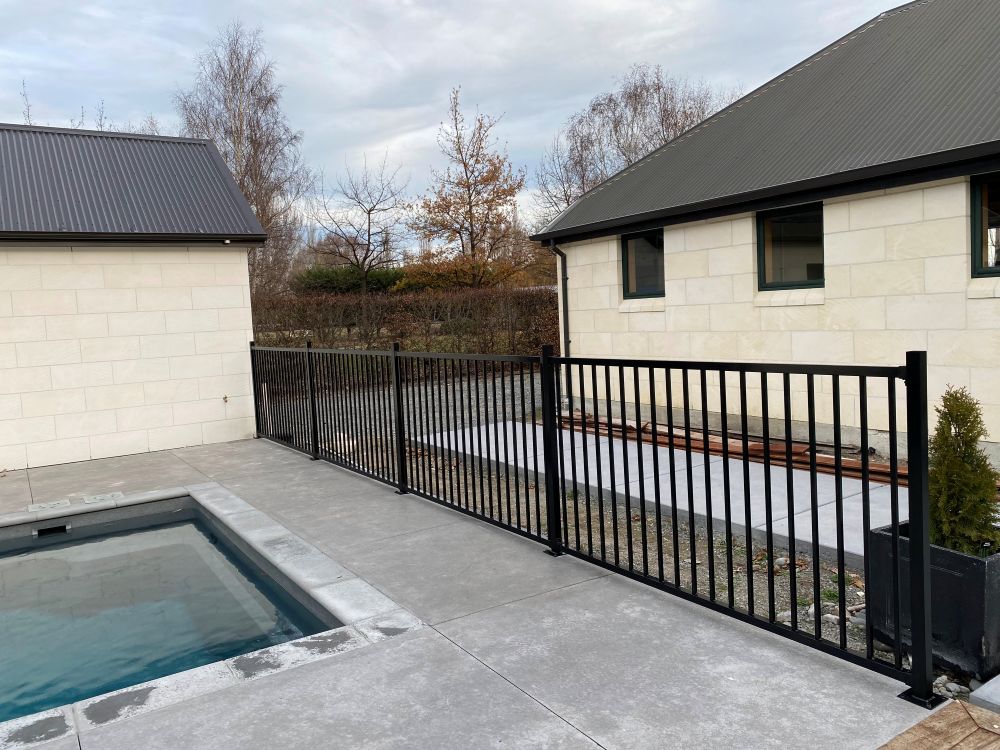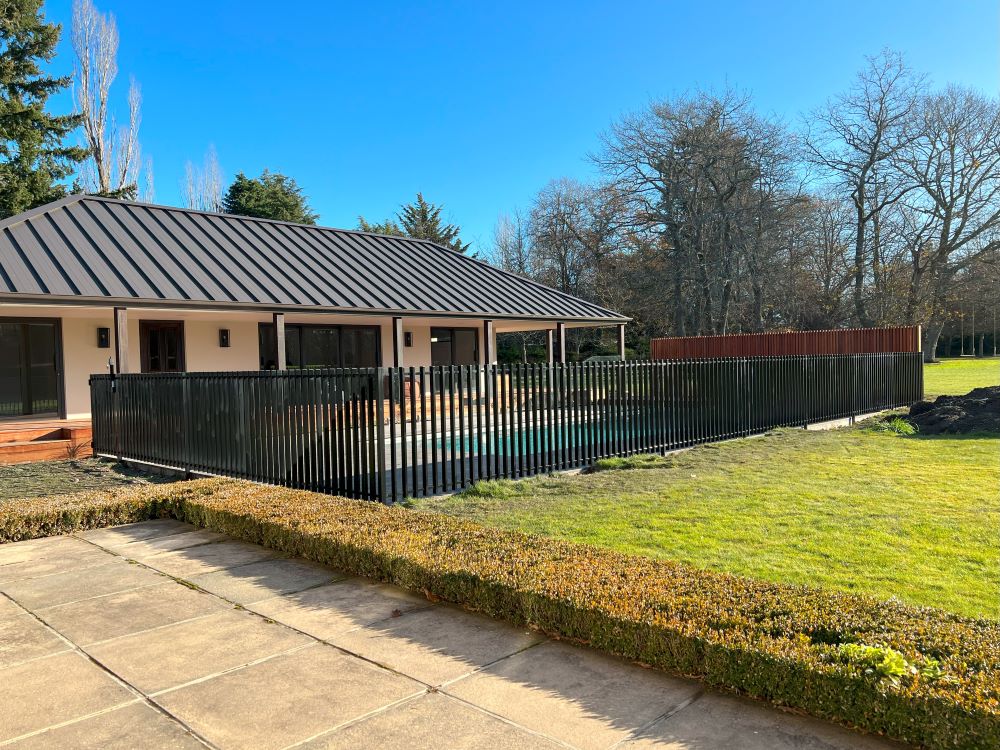Installing your own pool fence can be a rewarding project, saving you money while giving you the satisfaction of creating a safe, compliant, and attractive barrier around your pool. In Christchurch, however, pool fencing is subject to strict rules under the Building Code and local council regulations, so it’s essential to plan carefully before picking up your tools.
This guide walks you through everything you need to know about DIY pool fencing in Christchurch, from regulations and materials to installation steps and maintenance tips.
Understanding Christchurch’s Pool Fencing Rules
New Zealand Building Code Requirements for Pool Fencing
Under the Building (Pools) Amendment Act 2016, all pools in New Zealand must be enclosed by a compliant fence to prevent unsupervised access by children under five. The fence must be at least 1.2 metres high, have no gaps larger than 100mm, and be designed so it cannot be climbed.
Christchurch City Council’s Compliance Standards
In Christchurch, these national requirements are enforced by the Christchurch City Council. They require that pool fencing be inspected and approved both at installation and during periodic checks. The council also has specific guidelines for gates, latches, and boundary fencing when used as part of a pool barrier.
Penalties for Non-Compliant Pool Fencing
Failing to comply with pool fencing regulations can lead to fines, legal action, and being required to rebuild or alter your fence. Beyond the legal implications, a non-compliant fence poses serious safety risks, particularly for children.
Planning Your DIY Pool Fencing Project
Choosing the Right Location for Your Fence
Before buying materials, assess where the fence will be placed. It should completely enclose the pool without creating unnecessary hazards or obstacles in your backyard. Take into account garden layouts, access points, and any existing structures that could help or hinder installation.
Measuring and Marking Out the Pool Area
Accurate measurements are key to avoiding wasted materials or awkward gaps. Use stakes and string to mark the perimeter where your fence will go, and double-check measurements against local requirements for height and spacing.
Budgeting for Materials and Tools
DIY pool fencing is generally cheaper than hiring a professional, but you’ll still need to budget for materials, tools, and possibly some hired equipment. Consider the cost of panels, posts, gates, and fixings, as well as any extras like concrete or protective coatings.
Selecting the Best Pool Fencing Materials for Christchurch Conditions
Glass Pool Fencing Options
Frameless and semi-frameless glass pool fencing is popular in Christchurch for its sleek, modern look. It’s corrosion-resistant, easy to clean, and doesn’t block your view of the pool. However, it’s often more expensive and requires precision installation.
Aluminium Pool Fencing Benefits
Powder-coated aluminium fencing is lightweight, durable, and resistant to Christchurch’s coastal conditions. It comes in a variety of colours and styles, making it a versatile choice for most homes.
Timber Pool Fencing for a Natural Look
For a warmer, more natural appearance, timber fencing can blend beautifully into your landscaping. Treated timber is essential for weather resistance, but keep in mind that timber may require more maintenance over time.

Tools and Equipment Needed for DIY Pool Fencing
Essential Tools for Accurate Installation
At minimum, you’ll need a tape measure, post hole digger or auger, spirit level, drill, and concrete mixer or mixing tub. For glass fencing, suction cups and glass clamps will also be required.
Safety Gear for DIY Pool Fence Builders
Safety glasses, gloves, hearing protection, and steel-capped boots are recommended. If working with power tools or heavy panels, consider having a second person assist you.
Where to Hire or Buy Tools in Christchurch
Christchurch has several hire centres and hardware stores, such as Mitre 10 Mega, Bunnings, and Kennards Hire, where you can rent or buy the tools you need.
Step-by-Step DIY Pool Fencing Installation Guide
Preparing the Ground and Setting Posts
Start by digging post holes to the required depth, usually around 600mm for stability. Set the posts in place with concrete, ensuring they are level and aligned with your markings. Allow concrete to cure fully before attaching panels.
Installing Panels or Glass Panels Securely
For aluminium or timber fences, panels are usually attached to posts with brackets or screws. For glass, panels are fixed using stainless steel spigots or channels. Always follow the manufacturer’s instructions for spacing and securing.
Adding Gates and Safety Latches
Your pool gate must open away from the pool, be self-closing, and have a self-latching mechanism positioned at least 1.5 metres above ground level. Double-check latch operation before your council inspection.
Common Mistakes to Avoid in DIY Pool Fencing
Incorrect Fence Heights and Gaps
A fence that is even slightly under the minimum height or with gaps exceeding 100mm will fail inspection. Use a measuring tape frequently during installation.
Poorly Anchored Posts
If posts are not properly set, your fence could lean or fail over time, especially in strong Christchurch winds. Always ensure posts are firmly anchored.
Not Accounting for Christchurch’s Weather Conditions
Christchurch’s mix of hot summers, wet winters, and coastal air can cause corrosion or warping. Choose materials and coatings designed to withstand local conditions.
Getting Your DIY Pool Fence Approved
How to Book a Christchurch Pool Fence Inspection
Once your fence is installed, contact the Christchurch City Council to book an inspection. This can be done online or by phone.
Documentation You’ll Need for Compliance
You may be asked to provide measurements, material specifications, and any building consent paperwork if applicable.
What to Expect During the Inspection Process
An inspector will check height, spacing, latch operation, and overall compliance with safety standards. If your fence passes, you’ll receive formal approval; if not, you’ll be given a list of required changes.
Maintaining Your Pool Fence for Longevity
Cleaning and Caring for Glass and Aluminium
Regularly clean glass with a mild detergent and soft cloth to prevent staining. Aluminium fences benefit from occasional washing to remove salt and dirt.
Preventing Rust and Weather Damage
Inspect metal components for signs of rust and reapply protective coatings as needed. For timber, re-stain or seal every few years.
Regular Safety Checks for Kids and Pets
Check that gates self-close and latch properly, and that no furniture, planters, or climbable objects are near the fence.
Final Thoughts on Building Your Own Pool Fence in Christchurch
DIY pool fencing in Christchurch can be a cost-effective and satisfying project, provided you follow all safety regulations and council requirements.
By planning carefully, choosing the right materials, and installing with precision, you can create a pool barrier that’s both functional and attractive keeping your family safe and your property compliant.
